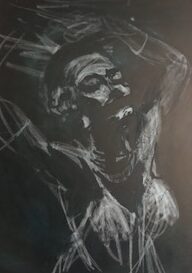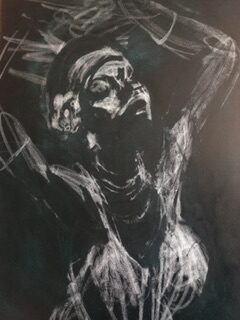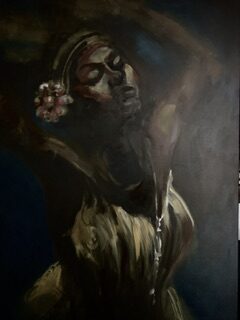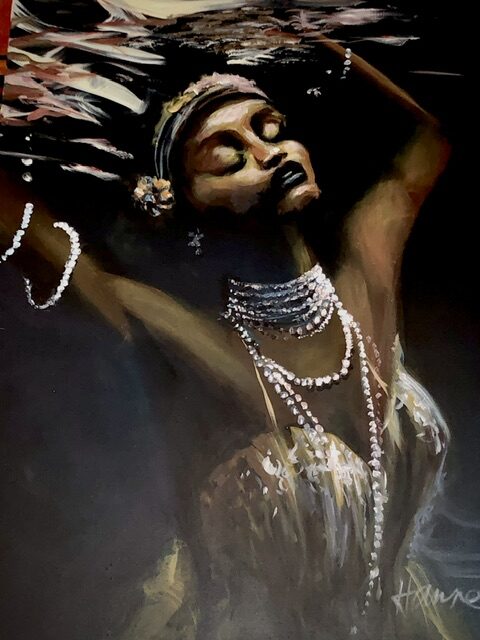La Petite Mort - The Little Death




La Petit Mort
2024
30 x 40
Acrylic on Canvas
Spotify Link to My Handy Man Ain’t Handy No More
Alberta Hunter
Songwriters: Andy Razaf and Eubie Blake
Now whoever said a good man was hard to find
Positively, absolutely sure was blind
'Cause I just found the best man that ever was
And here's just a few of the things that he does, ow
He shakes my ashes,
Greases my griddle,
Churns my butter,
And he strokes my fiddle, aw
My man, is such a handy man
Now he threads my needle,
And he creams my wheat,
Heats my heater,
And he chops my meat, he's a mess,
My man, is such a handy man
Now I don't care if you believe it or not,
He's a mighty nice man to have around,
'Cause when my furnace gets too hot, mm
He's right there to turn my damper down,
For everything, that man of mine's got a scheme
And honey it's amazing the way he handles my machine
My man, is such a handyman (oh that man is a mess ow)
He flaps my flapjacks,
Cleans off the table,
Feeds the horses in my stable,
My man, is such a handyman
And do you know, sometimes he's up, way before dawn,
Busy cleaning the rough edges off my lawn,
My man, is such a handyman
Now, he never has a single word to say,
While he's working hard (poor soul),
And I'd give anything if you could see the way,
He handles my front yard, aw
Now my ice never gets a chance to melt away,
'Cause he sees that I get a nice fresh piece everyday,
My man, is such a handyman
Alberta Hunter (1895–1984) was a celebrated blues and jazz singer/songwriter who emerged during the Harlem Renaissance. Her career, which spanned eight decades, began in Chicago when she was between 11 and 15 years old. Encouraged by stories of singers earning $10 a week, Hunter moved to Chicago, where she landed a singing job at Dago Franks, a brothel, with the help of sex workers. Her talent soon caught the attention of jazz pianist Tony Jackson, who mentored her in 1914. This mentorship and her growing reputation opened doors for her to perform in major cities like New York and London, as well as across Europe.
Upon returning to the United States, Hunter frequently traveled between New York City and Chicago, recording and performing in both cities. Seeking better opportunities, she moved to Europe again in 1933, where she appeared in the film Radio Parade of 1935. She worked predominantly in Europe during the 1930s until World War II began, prompting her return to the United States. During the war, Hunter dedicated herself to entertaining troops as part of a United Service Organization (USO) unit, performing her last show for Gen. Dwight D. Eisenhower in June 1945.
In 1950, Hunter made a surprising career change, enrolling in nursing school and working in healthcare for 20 years until her forced retirement, based on the mistaken belief she was 70, though she was actually 82. Her return to the music scene happened by chance in 1977, when she sang at a party for her friend Mabel Mercer. This led to a successful engagement at the Cookery in Greenwich Village and a commission from film director Robert Altman to record the soundtrack for the movie Remember My Name. Hunter continued to perform and record until her death in 1984 at the age of 89.
Hunter's personal life was marked by significant relationships, including her friendships with Mabel Mercer and other influential figures in the music industry. Despite societal norms, Hunter lived openly as a lesbian, a fact that was less publicly discussed during her time but known among her close friends and associates. In 1968, Memphis celebrated her achievements with Alberta Hunter Day, and she was posthumously honored by being inducted into the Blues Hall of Fame in 2011 and the Memphis Music Hall of Fame in 2015.